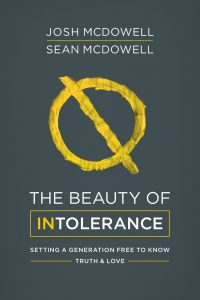Christian Youth Morality: Influenced More by Schools or Parents?
It’s not that our kids are rejecting Christianity, it’s that they have been influenced to define it according to their cultural setting. They are putting together their own religious canon in a smorgasbord style. Led to believe that it is better to pick and choose from various ideas, concepts of God, and religion around them, they construct a tailor-made “faith” that’s just right for them — and offends no one.
For example, listen to Amber, a typical sixteen-year-old Christian from a Christian youth group, as she responds to the question “Is it wrong to engage in premarital sex?”
“Well, responds Amber, “I believe it’s wrong for me.”
“But do you believe,” asks the leader, “that the Bible teaches that premarital sex is wrong for everyone?”
Amber takes a moment to weigh out her answer. She finally says, “I know it’s wrong for me, and I have chosen not to have sex until I’m married. But I don’t think I can judge other people on what they do.“

Confused About What God Says on the Matter
Clearly, Amber doesn’t believe the Bible provides a clear and definitive description of moral truth. If she did, her answer would have been more along the lines of, “God tells us in His word that we are to keep ourselves morally and sexually pure. So, yeah, it means we’re all supposed to wait until marriage.”
Like Amber, the majority of young people today do not operate from a purposeful adherence to God’s moral truth. Instead, they have bought into the notion that “truth” only exists where they choose to believe it does. One study suggests that a whopping 81 percent of our kids claim that truth is relative to personal circumstances. Which is why it’s easy for them to justify so many behaviors that God views as sin.
One student might steal from a store, for example, if he feels the store has ripped him off in the past. Another might choose to have an abortion, because she decides it’s the “kinder, more loving” thing to do for the unborn child she’s not ready to parent. Another might feel it “okay” to cheat on a college exam, because it was really mean of the teacher to assign so much reading over the Thanksgiving break. Like, doesn’t she care about my enjoying time with my family? And besides, doesn’t everyone cheat when they need to, just to deal with life? It doesn’t mean I’m a bad person!
Now you might be asking, “Who’s teaching my kids to think like this? I’ve tried really hard to be a good influence!”
The culprit influencing youth morality isn’t so much a person as it is the philosophy of cultural tolerance. To be specific, it’s a widespread cultural mindset and influence known as postmodernism. Complex, contradictory, and constantly changing, it’s basically a school of thought defined by what it’s not. Modernists rejected religion and superstition in favor of science and reason; postmodernists reject the notion of there being any real “truth,” period.
Postmodernism is definitely flexing its influence in the classroom.
Cultural Tolerance in the Classroom
Most educators and administrators don’t have a hidden secular agenda. They earnestly do want their students to develop and learn. But some educators view cultural tolerance as the moral glue that holds the school together. Most of these educators were themselves educated at universities that promoted moral relativism. So in their classrooms some of them stridently enforce diversity, as defined by cultural tolerance, even if it means trampling on our Constitutionally guaranteed freedom of religion.
Increasingly, legal cases are sprouting up to dispute educator attempts to keep God out of school:
One school employee told a five-year-old student she couldn’t pray over her lunch; another teacher refused to let a ten-year-old student write about God for a school assignment; school officials told students to stop praying to Jesus and singing “Amazing Grace” together during free time; an elementary teacher in Fort Lauderdale, Florida, made one of her students call his parents during class, as all the other students watched, to tersely inform them that their son’s “religious book” — which he was quietly reading during class quiet time — would not be permitted in her classroom.
Yet despite the personal agendas of these educators, Department of Education guidelines do allow students to read the Bible — or any religious text — during non-instructional periods in the classroom. The guidelines read in part: “Students may read their Bibles or other scriptures, say grace before meals, and pray or study religious materials with fellow students during recess, the lunch hour, or other non-instructional time to the same extent that they may engage in nonreligious activities.” Read here for further guidelines on religious rights in the classroom.
If we review the curriculums being taught at many public schools, we find them using cultural tolerance to influence youth morality. Many resources in the classroom have been revised to be “inclusive,” “sensitive,” “gender neutral,” and “antiracist.” Some of the curriculums even advocate a cultural narrative that denies the existence of moral truth. Values and morals are simply personal opinion. As children tend to believe more in what they learn in school than from their parents, parents need to diligently monitor how their kids view “truth.”
Is God Just a Myth?
Clear, objective truth can no longer be a trusted benchmark across society, if “truth” is to be personally discovered and applied. Whereas once our society had a clear-cut view of “right” and “wrong,” based on the Judeo-Christian values that undergird our Constitution, we are now a society comprised of people who demand complete freedom to “do our own thing.”
Those of us who enjoy a personal relationship with God, however, recognize that we willingly submit to God not because he’s a dictator or genie, but because He, alone, is our only true source of love and truth. Postmodernists might call us “ignorant” for believing in God’s goodness and care. But we can counter that it is they who are ignorant of the joy, strength, and peace that comes with consistently trusting in God over ourselves.
While we’ve been sleeping, cultural tolerance has greatly affected youth morality and thinking. Now that we’re awake to its pervasiveness, we must diligently counter-balance its influence on our young people. “That may be your truth, but it isn’t mine” is an inappropriate response, if we’re committed to living according to God’s Word.
Thought to Ponder
All of us, at some point in our lives, ask the questions, “Who am I?” “Why am I here?” “Where am I going?” Cultural tolerance has it wrong when it suggests that our true identity, purpose, and destiny can be found “within ourselves”, rather than through an intimate knowledge of God. Would you agree that Satan is using cultural tolerance to affect youth morality? Why or why not? How might you, as a parent, help your kids to recognize the God’s truth really is the only truth that we can count on?

This blog post has been adapted from the book The Beauty of Intolerance, by Josh and Sean McDowell.













